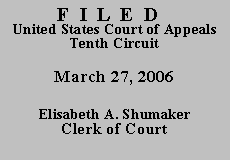

| ANDREW E. CLARENSON,
v.
GARY GOLDER, Warden, Sterling
Correctional Facility; KEN
SALAZAR, Colorado Attorney
General |
No. 05-1071
(D.C. No. 04-Z-1919) (Colorado) |
Mr. Clarenson pled guilty to one count of menacing and was sentenced to five years incarceration and two years parole. He filed the present habeas petition, claiming violations of his right to due process as well as his rights under the Americans with Disabilities Act and the First, Fourth and Sixth Amendments. Regarding the exhaustion of his state court remedies, Mr. Clarenson claimed that he filed a direct appeal as well as motions for collateral review after the United States Supreme Court issued its decision in Blakely v. Washington, 124 S. Ct. 2531 (2004). In three successive orders to show cause, the magistrate judge assigned to review Mr. Clarenson's habeas petition ordered him to provide documentation of the state court proceedings or specifically state the claims he raised in those proceedings and their final dispositions. None of Mr. Clarenson's responses to the orders contained the requisite documentation or specific statements. Moreover, Mr. Clarenson indicated in his final response that a writ of certiorari and a motion for post-conviction relief were pending in state court. Accordingly, the district court dismissed Mr. Clarenson's habeas petition for failure to exhaust his state court remedies and denied his subsequent motion to reconsider for the same reason.
Section 2254(b) requires that "[a]n application for a writ of habeas corpus in behalf of a person in custody pursuant to the judgment of a State court shall not be granted unless it appears that the applicant has exhausted the remedies available in the courts of the States . . . ." § 2254(b)(1)(A). See also Moore v. Schoeman, 288 F.3d 1231, 1232 (10th Cir. 2002). Because Mr. Clarenson stated in his response to the court's order to show cause that he was still awaiting final dispositions in at least two state court proceedings, the district court dismissed his § 2254 habeas petition without prejudice pending the exhaustion of his state court claims.
Issuance of a COA is jurisdictional. Miller-El v. Cockrell, 537 U.S. 322 (2003). A COA can issue only "if the applicant has made a substantial showing of the denial of a constitutional right." 28 U.S.C. § 2253(c)(2). When a district court has dismissed a habeas petition on procedural grounds, such as exhaustion, a COA will issue only when "jurists of reason would find it debatable whether the district court was correct in its procedural ruling." Slack v. McDaniel, 529 U.S. 473, 484 (2000). Having reviewed the district court's ruling and the record on appeal, we conclude that jurists of reason would not find debatable the district court's ruling that Mr. Clarenson had not yet exhausted his state court remedies.
On appeal, Mr. Clarenson claims that both of his pending postconviction applications in state court have since been denied. He claims that his petition for a writ of certiorari to the Colorado Supreme Court was denied on March 28, 2005, and his Blakely motion was denied by the state trial court on February 17, 2005. He does not include any documentation of the state court denials, however, and we thus have no evidence with which to confirm his claims. Moreover, the trial court's denial of the Blakely petition does not exhaust the claim. As a result, Mr. Clarenson has not met his burden of demonstrating that he has exhausted his state court remedies. See Olson v. McKune, 9 F.3d 95, 95 (10th Cir. 1993).
In addition to this appeal, Mr. Clarenson filed a "Notice of Suspected Conflict of Interest and Violation of Article VI U.S. Constitution" in which he claims that the magistrate and district judges have conflicts of interest with the Colorado Attorney General, who is a named defendant. Specifically, Mr. Clarenson states that a letter sent to the Clerk of Court from assistant Colorado attorney general Laurie Booras, notifying this court that the appellees did not intend to file an answer brief unless a COA issued, indicates that the office of the attorney general "is now acting as defense counsel" to the magistrate and district judges. Mr. Clarenson, however, is mistaken. The magistrate and district judges are not "defendants" (or even appellees) in this matter and therefore do not require counsel. Moreover, the office of the attorney general sent the April 8, 2005 letter on behalf of the Attorney General, not the judges. Accordingly, Mr. Clarenson has not presented a cognizable basis for his alleged conflict of interest. We decline, therefore, to grant the relief requested by Mr. Clarenson in his notice.
In sum, we DENY Mr. Clarenson's motion to proceed ifp, DENY his request for a COA and his application entitled "Notice of Suspected Conflict of Interest," and we DISMISS the appeal.
SUBMITTED FOR THE COURT
Stephanie K. Seymour
Circuit Judge
*.After examining appellant's brief and the appellate record, this panel has determined unanimously that oral argument would not materially assist the determination of this appeal. See Fed. R. App. P. 34(a)(2) and 10th Cir. R. 34.1(G). The case is therefore submitted without oral argument. This order and judgment is not binding precedent, except under the doctrines of law of the case, res judicata, or collateral estoppel. The court generally disfavors the citation of orders and judgments; nevertheless, an order and judgment may be cited under the terms and conditions of 10th Cir. R. 36.3.
1.The district court denied Mr. Clarenson's motion to proceed in forma pauperis on appeal. Although Mr. Clarenson has not renewed his motion to proceed ifp on appeal before us, he has so applied in the related appeal of Clarenson v. Owens, 05-1090. We construe his application in the related case as applicable to the present one.